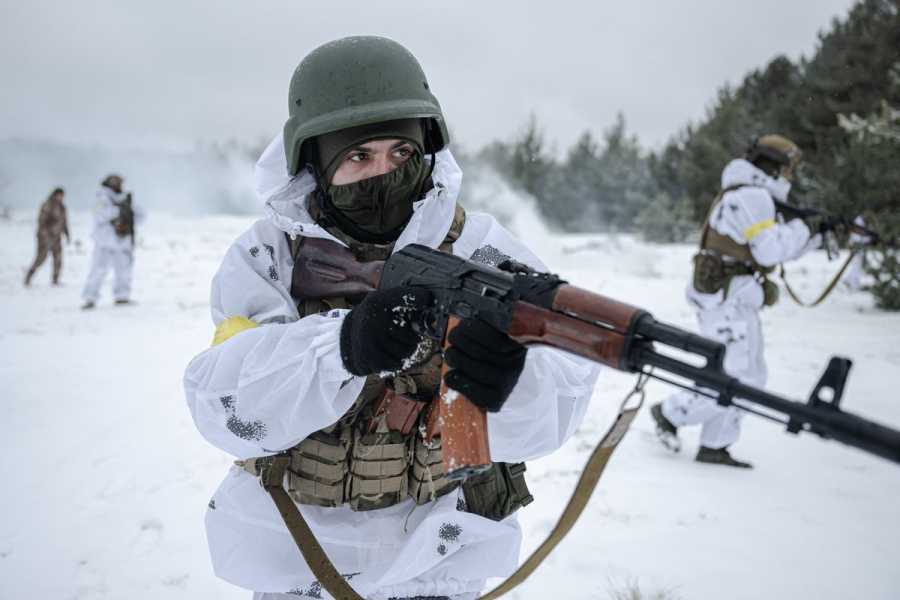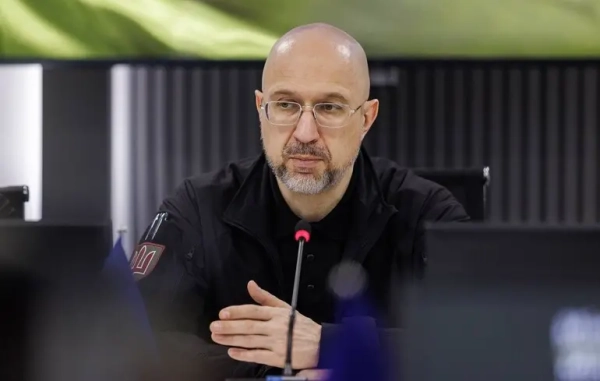Congress should have approved Ukraine aid yesterday.

Ukrainian border guards conduct training on patrolling the borderline in February. Viacheslav Ratynskyi/Anadolu via Getty Images Zack Beauchamp is a senior correspondent at Vox, where he covers ideology and challenges to democracy, both at home and abroad. Before coming to Vox in 2014, he edited TP Ideas, a section of Think Progress devoted to the ideas shaping our political world.
As the Senate considered approving $61 billion to Ukraine this weekend, Donald Trump published an all-caps rant making his opposition clear.
“FROM THIS POINT FORWARD, ARE YOU LISTENING U.S. SENATE(?), NO MONEY IN THE FORM OF FOREIGN AID SHOULD BE GIVEN TO ANY COUNTRY UNLESS IT IS DONE AS A LOAN,” he wrote on his Truth Social platform on Friday.
The Senate rejected Trump’s order, passing the bill Tuesday morning 70-29. But the bill still needs to clear the Republican-controlled House, where the former president’s influence has proven powerful in the past. Indeed, House Speaker Mike Johnson (R-LA) has already stated opposition to the Senate aid bill.
Which makes now a good time to remind ourselves that the objections to Ukraine aid are absurd.
Supporting Ukraine’s defense is one of the single easiest foreign policy calls of my lifetime, a policy that has both protected Ukrainians from Russian slaughter and advanced America’s geopolitical interests in Europe. It has done so at a relatively low cost in dollars and zero cost in American lives. There is nothing to gain by abandoning it, and everything to lose.
Let’s start with the most basic point: Russia’s invasion of Ukraine was an act of evil. Since the war’s beginning, the Russian government and its propaganda outlets have openly announced that their war aim is to seize Ukrainian territory and subjugate its government to the Kremlin.
This was evident not just in words, like President Vladimir Putin’s recent interview with Tucker Carlson, but also in deeds. The war began with a failed lightning thrust targeting the Ukrainian capital in Kyiv, during which Russian forces engaged in horrific atrocities: executing entire families and indiscriminately bombing populated areas.
vox-mark
Sign up for the newsletter Today, Explained
Thanks for signing up!
Check your inbox for a welcome email.
Email (required)
Oops. Something went wrong. Please enter a valid email and try again.
By submitting your email, you agree to our Terms and Privacy Notice. You can opt out at any time. This site is protected by reCAPTCHA and the Google Privacy Policy and Terms of Service apply. For more newsletters, check out our newsletters page. Subscribe
There are many problems with the Ukrainian government it is an imperfect democracy whose battlefield performance has worsened as the war degenerated into a kind of stalemate. Its maximalist stated objective of winning all its territory back through force may very well be impossible.
But the justice of its basic cause is unimpeachable. Ukraine is fighting a classic war of self-defense, a country protecting its people and its sovereignty from a large neighboring dictatorship that wishes to crush it.
And the success of Ukraine’s war hinges crucially on American support.
Why American aid is so important
The United States, labeled “the arsenal of democracy” during World War II, is playing that role again today. America is providing Ukraine with advanced weapons systems, like HIMARS mobile artillery, and ammunition that neither the Ukrainians nor European allies can get to the field on their own in sufficient numbers.
Currently, American funding has been effectively suspended due to the holdup in Congress. We can already see the consequences: Ukrainian fighters, working with a third of the ammunition they need to fight, being forced to retreat.
What happens if the aid dries up indefinitely? Vox’s Josh Keating reported on this extensively, and his sources painted a grim picture:
“A failure to supply military aid to Ukraine isn’t going to cause an immediate Russian victory, but it is going to change the character of the war,” said Franz-Stefan Gady, a defense analyst with the Center for a New American Security who has made multiple research trips to the front lines in Ukraine. Gady said that while Ukraine’s military has traditionally been an “artillery dominant military force,” without shells for those guns, “they would likely start pursuing more asymmetric strategies. That is, withdrawing from certain sectors of the front lines into urban settlements, trying to draw Russian forces into urban combat.”
This scenario is … a grim prospect for Ukraine’s civilians. Urban combat always has an extremely high civilian death toll and given the heavy-handed tactics employed by the Russian military, the list of Ukrainian cities and towns entirely decimated by war — Mariupol, Bakhmut — would likely grow.
Even if you see the US government as human rights hypocrites or don’t believe protecting Ukrainian lives is America’s concern, the outcome of this war directly affects US interests.
Currently, the fighting is mostly in Ukraine’s more rural eastern half. If it moves west, into the heart of Ukraine’s largest cities, it moves closer to nearby NATO treaty allies. The odds of a scary spillover incident — of a miscalculation that could trigger a wider war between Russia and the American-led alliance — would rise accordingly.
At present, the best way to limit the risk of war between nuclear-armed powers is to help Ukraine keep Russia physically further away from NATO borders. Continuing aid, by contrast, is unlikely to trigger a direct escalation between Russia and the United States — as the past two years of fighting have shown.
Global security is worth a lot more than $61 billion
Again, it is unlikely that Ukraine will simply defeat Russia and win back all of its territories. The most likely scenario for the war’s end is — like most wars — negotiation.
But as in any negotiation, leverage matters. Political scientists often describe war as itself a process of bargaining, one in which it’s rational for states to continue fighting until the balance of power between the two sides is clear. To bring about a settlement in which Russia’s aggression is punished rather than rewarded, Ukraine needs to be strong on the battlefield.
And if Russia is rewarded, it has an incentive to engage in more provocations on NATO’s frontier. A world where Ukraine is forced to the table by American abandonment is a vastly more dangerous one.
Sixty-one billion dollars sure sounds like a lot of money. But the amount it purchases — sovereignty for an embattled democracy, civilian safety from Russian massacres, and decreasing the odds of a terrifying wider war — is easily worth the price. For Congress to do anything but rush it through would be an appalling betrayal not just of Ukraine, but of America.
This story appeared originally in Today, Explained, Vox’s flagship daily newsletter. Sign up here for future editions.
Sourse: vox.com






